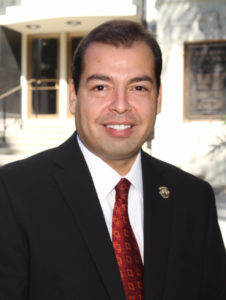Q&A with Justin Hess, CCMF Vice President and City Manager of the City of Burbank.
What attracted you to a career in local government?
Growing up, I always had an interest in government and public service. I truly value the ability to have a positive impact on someone. City management is all about making a difference each and every day. Simply put, I am in this business to do things that will have a positive effect and benefit my local community. As a result, this has driven me to stay in local government and pursue a career in city management.
I began my career as an intern in the City of Burbank’s Planning Division while I was completing my undergraduate degree at UCLA. For the past nineteen years, I have been fortunate to work in a variety of different positions. People often don’t realize how many different city services and programs occur on a daily basis. Doing my part to provide these services and working to build a better community makes coming to work each day a rewarding experience.
What was your path to becoming a City Manager?
I am your classic “rise through the ranks of an organization” City Manager. After my start as an intern, I have served a variety of roles throughout my career in the City of Burbank. Prior to my current role, some of my positions included Financial Services Director, Management Services (Human Resources) Director and Community Development Director and Assistant City Manager. Partway through my career, I earned my master’s degree from USC’s School of Public Policy. Serving in different departments has provided me with unique perspectives that have proven beneficial in managing the responsibilities of City Manager. I am very grateful for the opportunity to take on a variety of leadership roles.
What project are you most proud of from your time as a City Manager?
While there are a lot of projects that make me proud, there is a relatively small one that is a big deal to me. During my tenure in the City Manager’s office, I have been committed to providing college students interested in public administration with the opportunity for internships. Over the last several years, we have recruited interns to work in the City Manager’s office and introduce them to the inner workings of city government. I like to call it the “All Access Pass to city government,” as we attempt to show each intern as much about city operations as we can during their time with us. Often, classroom discussions about government revolve around the state and federal levels of government. I found that providing student interns the opportunity to discover all the different types of jobs and skill sets involved in local government is an eye-opener for each of them. It is important that smart and capable individuals enter local government; we can help achieve that by promoting such a rewarding profession.
What do you enjoy the most about being a City Manager?
I enjoy many aspects of my role as city manager. Particularly, I like when we make a positive impact on a citizen or group of citizens. It can be as simple as filling a pothole or assisting a business coming to town. I also greatly enjoy the high caliber of professionals that I work with. Having talented and capable colleagues and co-workers is invaluable.
When and how do you interact with the residents of your City?
On a regular basis, I engage with a wide variety of residents. I really enjoy the time I get to interact with the public and hear what is on their minds. We have a strong Public Information Office that is run out of the City Manager’s Office. One of our goals is to figure out and implement the most effective ways to communicate with residents. Our diverse citizenry creates the constant challenge of determining how to maximize the city’s communication reach with limited resources.
What are the greatest challenges facing City Managers in the state today?
Among the various challenges for City Managers, one of the greatest is the need to establish a stronger level of public trust. In a post-Bell world, the public trust in government continues to remain low, and this makes it challenging for cities to move forward with new ideas. Cities need to continue to be transparent and engage their citizens. The more we can build trust and respect, the easier it will be to carry out new ideas and deal with other challenges ahead of us. Building trust creates a more collaborative environment which can result in a stronger community.
As a City Manager, how do you help uphold the public’s trust in local government?
The role of a City Manager in upholding public trust is critical. As a longtime member of ICMA, I appreciate the role they have had in developing a Code of Ethics for the profession. City governments are entrusted with millions of dollars of taxpayers’ money. We must be open and transparent about how that money is spent. We should also be continually looking for the most effective and efficient methods for using it. The bottom line is that our profession should always be committed to high ethical standards.
As City Manager, I am committed to operating in an ethical way, embodying the high standards of this profession, openly and honestly addressing the public’s needs and using my platform to actively earn the public’s trust.
What are some of the benefits of a council manager form of city government?
A Council-Manager form of government offers many benefits to a community and allows for a balance between citizen advocacy, the strong political leadership of a Council and the managerial expertise of a professional City Manager. These combined aspects allow for greater representation of various segments of a community, a focus on policy issues that are responsive to citizens’ needs and wishes and accountability for the delivery of services to a community. While a Council serves as the legislative body of its community, its decisions are simultaneously influenced by the informed recommendations of a City Manager and his or her staff, as well as the voices of advocates in the community. This structure creates a dynamic that is responsive to the needs of the community, ensuring that policies set forth by the Council focus on community goals while providing for the responsible management of community resources and provision of programs and services by appointed managers and their staff.
How does the issue of local control impact the future of California?
Local control remains a central concern in all areas of life in California. From housing to transportation to local funding, cities continuously lobby federal, state and county governments to retain control of local affairs and revenues. As a charter city and a full-service city, Burbank particularly prides itself on the business- and family-friendly community it has built throughout the years. Prior to the COVID-19 pandemic, the State’s aggressive push on housing legislation to address the lack of affordable, jobs-accessible housing created consternation for many local governments as residents and government leaders alike sought to preserve single family neighborhoods and retain the flexibility to create responsible developments that not only provided housing but promoted sustainable, enhanced communities. Burbank’s motto has always been to “not just build buildings, but build beautiful, thriving communities.”
With the onset of the pandemic, many cities saw state and county health orders that pushed the burden of enforcement on municipalities and federal funding that trickled down through state or county programs. With the closure of businesses, schools and places of work, many communities found themselves constrained in their local response to the pandemic and the recovery programs and services they were able to provide to residents and businesses. As the state recovers from the impacts of the pandemic, and as issues of the economy and housing continue to be at the forefront of California politics, cities will continue to assert the need for local control to properly rebuild, strengthen and grow their communities.

